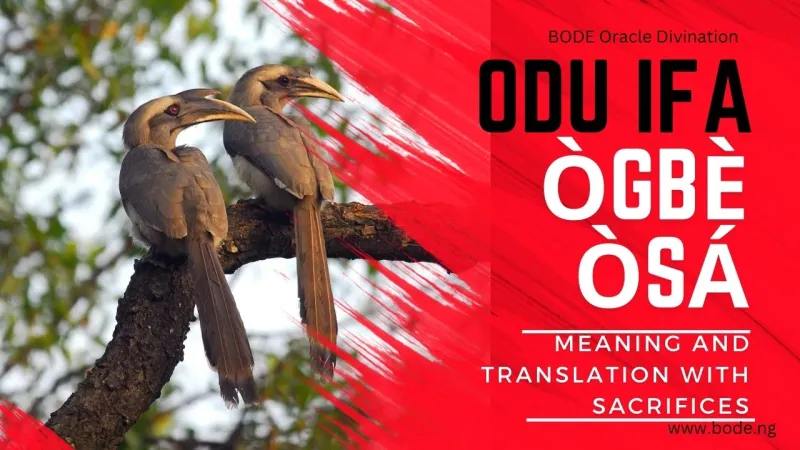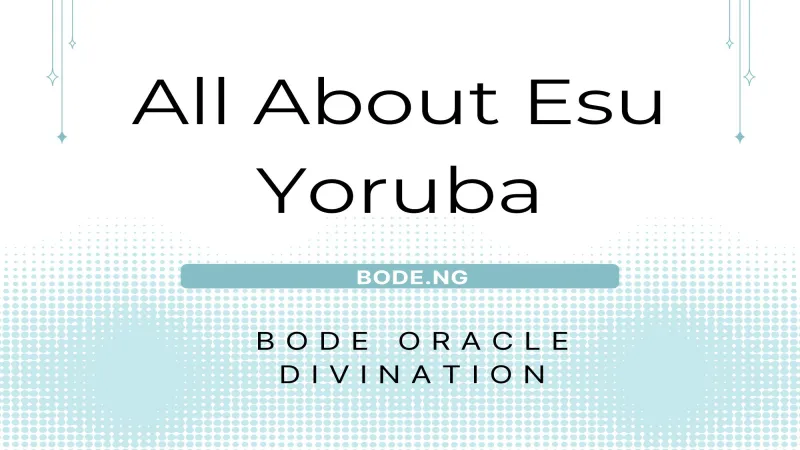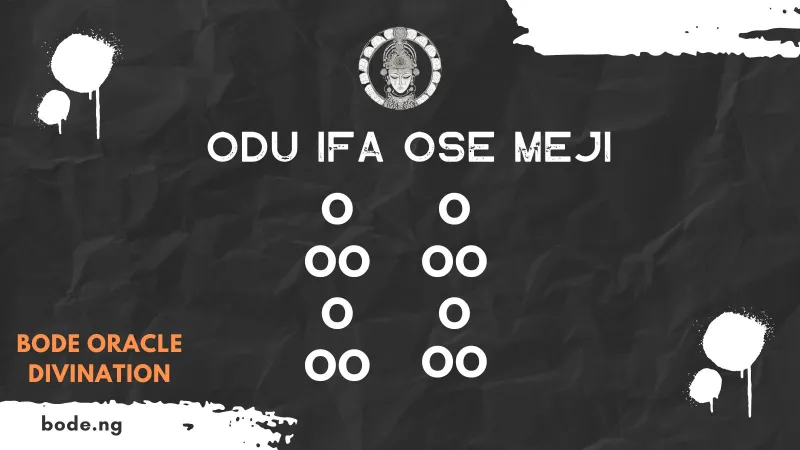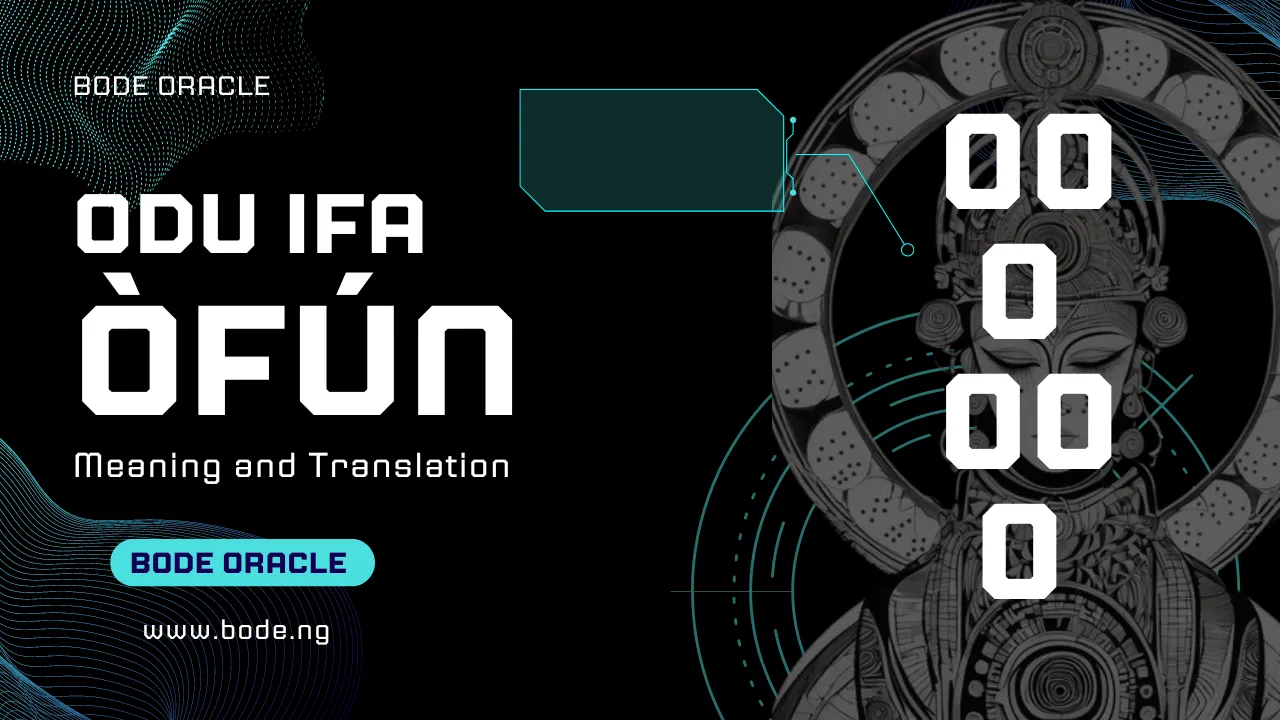Ogbe Osa also known as Ogbe Sa teaches that challenges can be overcome with faith, sacrifice, and guidance from the divine. This Odu guides individuals toward prosperity, urging them to perform sacrifices to avert misfortune and secure blessings.
Ogbe Osa, Ogbe Sa: Ifa Orunmila and the Spirits of Misfortune
The hand sees pounded yam, the hand lifts it upward
It is the thumb that sees same day harvested corn, that was joyful
This was the Ifa cast for Orunmila
When he send his child to the forest to escape death.
Orunmila became suspicious of his enemies as they plotted against him, So he bow down and called on the Awo (priests). They cast Ifa and advised him to offer a sacrifice.
They prescribed the sacrifice, and he made the offering. At the time when his enemies sent the spirits of misfortune after him, They could not reach Orunmila's house, his child, nor his wife.
Instead, the spirits of misfortune turned back upon his enemies. And Orunmila said:
The hand sees pounded yam, the hand lifts it upward
It is the thumb that sees same day harvested corn, that was joyful
This was the Ifa cast for Orunmila
When he send his child to the forest to escape death.
Death entered my house but did not touch me
The gourd of the spirit of emptiness died midway
Illness entered my house but did not touch me
The gourd of the spirit of emptiness died midway
All the spirits of misfortune entered my house but could not touch me
The gourd of the spirit of emptiness died midway.
Ogbe Osa, Ogbe Sa: Ifa Orunmila Who Went to Farm and Became Wealthy
A damaged money does not get thrown away
This was the Ifa cast for Orunmila
On the day he was going to farm to become wealthy.
Orunmila had planned to go perform spiritual work in the countryside, but he was hesitant, unsure whether to go or stay.
So he bowed down, and summoned the Awo (priests).
They cast Ifa, and told him to offer a sacrifice, stating that Orunmila would return home safely and with wealth.
They prescribed the sacrifice, and Orunmila made the offering.
When he arrived at the place, he helped those in need by casting Ifa for them, and one by one, people began to prosper. As a result, they gathered gifts and tribute for Orunmila, and he returned home wealthy from the farm. He said:
A damaged money does not get thrown away
This was the Ifa cast for Orunmila
On the day he was going to farm to become wealthy.
He said, “Ogbe Sa (Ogbe ran away)
Ogbe overcame
Ogbe safely returned from the farm.”
Divination Instruction
Ifa decreed that he should offer the sacrifice so that he could receive abundant blessings.
Ogbe Osa, Ogbe Sa: Ifa For Many Followers (Gbomu-Gbomu Sigidi)
Ifa declared that the one who cast Ogbe-Sa will have many followers; they must offer a sacrifice.
Gbomu-Gbomu Sigidi
Sigidi Gbomu-Gbomu
This was the Ifa cast for the king of Oyo,
The one who carries snails to offer calmness
Gbomu-Gbomu-Gbomu.
The king of Oyo, whom this Ifa refers to, had no followers, so he called on the Awo (priests) to investigate the cause. They told him he must offer a sacrifice, specifically to offer two hundred snails to the Odu Deity, and they promised that he would gain many followers.
The sacrifice was prescribed, and the king made the offering. After he made the sacrifice and offered the snails to the Odu, it didn’t take long before the king of Oyo began gaining followers.
Alara sent a follower to the king of Oyo, Ajero also sent one, and Owarangun followed suit. Soon, the king of Oyo had many followers.
He praised the Awo, and the Awo praised Ifa. He said:
Gbomu-Gbomu Sigidi
Sigidi Gbomu-Gbomu
This was the Ifa cast for the king of Oyo,
The one who carries snails to offer calmness
Gbomu-Gbomu Sigidi
Sigidi Gbomu-Gbomu.
Alara will serve,
Gbomu-Gbomu Sigidi
Sigidi Gbomu-Gbomu.
Ajero will serve,
Gbomu-Gbomu Sigidi
Sigidi Gbomu-Gbomu.
Owarangun will serve,
Gbomu-Gbomu Sigidi
Sigidi Gbomu-Gbomu.
Ogbe Osa, Ogbe Sa: Ifa Oridara
The Allied Hornbill of Benin
Ostrich of Ijamo
The african grey hornbill of Iwonran
These were the ones who performed Ifa for the king One after the other.
This was the Ifa cast for Oridara,
A servant of The First Osorun
Oridara, who Ifa speaks of here, was very poor and destitute, his life was full of struggles, and he was also a servant. He decided to think about what he could do, and what path he could take to improve his situation.
He thought the best thing for him was to leave his town and go somewhere else. However, before leaving, he decided to consult with the Awo (priests).
The Awo told him that before he leaves, he must offer a sacrifice so that his destiny can lead him to a place where he will prosper.
He heard the advice, offered the sacrifice, and the sacrifice was accepted.
Oridara then set off. When he reached his destination, his destiny blessed him, and he began to prosper. Oridara became joyful, and his heart was filled with happiness. He praised the Awo, and the Awo praised Ifa. And the Awo said:
The Allied Hornbill of Benin
Ostrich of Ijamo
The african grey hornbill of Iwonran
These were the ones who performed Ifa for the king One after the other.
This was the Ifa cast for Oridara,
A servant of The First Osorun
The good place where destiny carried me, I did not know it
The gentle breeze carried the Allied Hornbill of Benin
The good place where destiny carried me, I did not know it.
Divination Instruction
Ifa decrees that the one who cast Ogbe-Sa must offer a sacrifice so that their destiny will lead them to a place of blessing.
YORUBA Translation
Ogbe Osa, Ogbe Sa: Ifa Orunmila Ati Awon Ajogun Ibi
Ọwó ri iyan, ọwó y’óké
Àtàǹpàkò ló rí àgbàdo òjò ló ṣe mùlúnkú mùlúnkú
A d’Ífá fún Òrúnmìlà
Yí óò gboọmọ rè sá gàjà nitori ikú.
Òrúnmìlà ni ó fura si àwọn òtà nigbati wọn ńbá a já, ni ó bá gbé òkéìpònrí rè ka’lé ó pé áwọn Awo, wón ba dá Ifá. Wọn ní ẹb ni kí ò rú.
Wọn yàn-àn lẹbọ, ó rú’bọ. Àsìkò tì àwọn òtá bá nran àwọn ajogun ibi, wọn kíí bá Òrúnmìlà ni ilé, wọn kó ni bá ọmọ rè, béè ni wọn kó ni bá iyáwó ré. Ni àwọn ajogun ibi bá ńfi ábó s’órí àwọn òtá Òrúnmìlà. Ó ni:
Ọwó ri iyan, ọwó y’óké
Àtàǹpàkò ló rí àgbàdo òjò ló ṣe mùlúnkú mùlúnkú
A d’Ífá fún Òrúnmìlà
Yí óò gbọmọ rè sá gàjà nitori ikú
Ikú wọlé mi kò bá mi
Kérégbè òfifo o mà kú àrin nú
Àrún wo’lé mi kò bá mi
Kèrégbè òfifo o mà kú àrin nù
Gbogbo ajogun ibi wọlé mi wọn kò bá mi
Kèrègbè òfifo o mà kú àrin nù
Ogbe Osa, Ogbe Sa: Ifa Orunmila To Roko Ree La
Ìbájé owó kò láṣànú
A d’Ífá fún Òrúnmìlà
L’ọjọ ti ó n roko réé lá.
Òrúnmìlà ni ó fẹ ṣawo lọ si ìgbèriko, ni ominú wá ńkọ ó wípé àbi kí òun ó lọ tàbí ki òun ó má lọ. Ni ó bá gbe ókéìpònrí ré kalè, ó pé àwọn Awo, àwọn Awo ba dá Ifá, wón ní ẹbọ ni Kí ó rú wipé Òrúnmìlà yí óò lá wálé Láti ibé ni.
Wọn bá yan Òrúnmìlà lẹb. Ó rúb. Ó de ibẹ, ení tí kò rí ṣe, Òrúnmìlà ṣe Ifá fún wọn, onikálukú bèrè sí rí ṣe.
bayii ni wón ṣe ńkó ẹrú Kó ẹni fún Òrúnmìlà ti ó sì ti oko là wálé. Ó ni:
Ìbájé owó kò láṣànú
A d’Ífá fún Òrúnmìlà
L’ọjọ ti ó n roko réé lá.
Ó ni Ogbè sá òòò
Ogbe là
Ogbè ló roko rèé lá
Àṣẹ: Ifá pé kí ó rú’bọ kí ó le ba ni ire lọpọlọpọ.
Ogbe Osa, Ogbe Sa: Ifa Gbomu Gbomu Sigidi
Ifá pé ẹni tí ó dá Ogbè-Sá, Ifá pé yí óò ni olusin lópòlọpọ, ẹb ni kó rú.
Gbómú-gbómú Ṣígídí
Ṣígìdì gbómú-gbómú
A d’Ífá fún ọba l’Óyòó
ọmọ amúgba igbin pèrò loye
gbómú-gbòmú-gbómú
Oba l’Óyóó tí Ifá ńsọ yíí kó ni olusin, ni ó bá pe Awo wípé kí wọn ó bá òun ṣe iwádìí rè ohun ti ó fàá. Wón ní ẹb ni ki ó rú, kí ó fi igba ìgbín bọ Odú, wón ni yi óò ni olusìn. Wón yán án lẹbọ. Ó rúbọ.
Wón bá fi igba ìgbín bọ Odú. Kò ì pé ni ọba lóyòó bá bèrè si ni olusin. Alárá fi olùsín ránṣé sí ọba l’Óyòó, Ajerò náà fi ránṣé, Owárángùn náà bèè, bàyìí ni ọba lóyòó bèrè sì ni olusin lópólọpọ. Ó wa nyin Awo, Awo nyin Ifá. Ó ni:
Gbómú-gbómú Ṣígídí
Ṣígìdì gbómú-gbómú
A d’Ífá fún ọba l’Óyòó
ọmọ amúgba igbin pèrò loye
gbómú-gbòmú ṣígídì
Ṣígìdì gbómú-gbómú
Alárá a ó sin
gbómú-gbòmú ṣígídì
Ṣígìdì gbómú-gbómú
Ajerò a ó sìn
gbómú-gbòmú ṣígídì
Ṣígìdì gbómú-gbómú
Ọwáràngùn a ó sìn
gbómú-gbòmú ṣígídì
Ṣígìdì gbómú-gbómú
Ogbe Osa, Ogbe Sa: Ifa Oridara
Àtíòro Ìbínì
Ògóngó Ìjámó
Àgbìgbò ni Ìwọnràn
Àwọn ni wọn ṣawo ọba ‘Léyò kankan
A d’Ífá fún Orídára
Tíí ṣe ẹrú Ọṣòrun àkókò
Orídára tí Ifá nsọ yíí, táláká ni, kò ri ṣe, ojú npon gidi gidi, erú tún ni Ó wá pinu wípé kinni óun lè ṣe, àti wípé ònà wo ni òun lè gbá
tí yí óò fi dára fun óun. Ó ni ohun tí òun lè ṣe ní wípé kí òun ó fi ilú sílè lọ si ibòmirán.
Ṣùgbón kí òun ó tó lọ, òun ó ṣe iwádìí. Ni ó bá lọ sí òdó àwo. Àwọn Awo ní kí ó tó lọ, ki ó rùbọ, ki ori rè lè gbe dé ibi tí yí óò tí lá. Ó gbó riru ẹbọ ó rú. Ẹbọ fin, ẹbọ dà, ni ó bá gbéra ó lọ.
Ígbàtí Orídára Dé ibẹ, ẹsé rè gbe dé ibi tí yí óò tí lá. Orídára bere sí níí yọ. Inú un rè dùn. n yin Awo, àwọn Awo n yin Ifá, óno béè làwọn Awo wi:
Àtíòro Ìbínì
Ògóngó Ìjámó
Àgbìgbò ni Ìwọnràn
Àwọn ni wọn awo ọba Léyò kankan
A d’Ífá fún Orídára
Tíí ṣe ẹrú Ọṣòrun àkókò
Ibi rere tórí ngbe mi rè, nkó mọ ibè
Èfufu lele lò ti ńgbe atíòro ré Ibiní
Ibi rere tórí ń gbé mi rè, nkó mọ bé
Àṣẹ: Ifá pé ẹni tí ó dá Ogbè-Sá, Ifá pé ẹbọ ni ó rú, kí orí i rè lé ba gbe dé ibi ire ti yíó ti lá.



